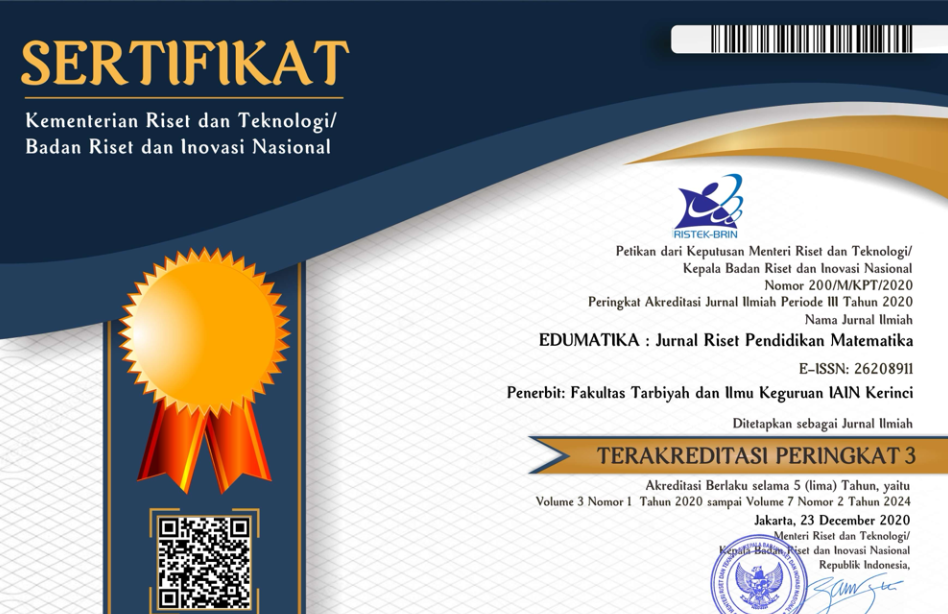Developing a Mobile Game Using Scientific Approach to Support Mathematics Learning
Abstract The widespread use of smartphones to play games and the lack of use as a medium for learning mathematics is the reason for the need for the development of smartphone-based edutainment learning media. The purpose of this research is to design and develop interactive edutainment learning applications of mobile mathematics games to help junior high school students to learn line and angles material. This mobile game-based application incorporates graphic design, background music, and animation, and a major structural element in game development to attract students. This research belongs to the type of Research and Development (R&D) and the model used is the ADDIE model that is carried out in a systematic stage. The results of the study show that the developed game meets the valid aspects, where the level of expert approval of the design functionality has an average value of 4,49 out of 5, meanwhile, the assessment of the material has an average score of 4,17 out of 5 and the user states that the game meets the practical aspect with an average score of 3,75 out of 5. It is hoped that this game-based learning application called "CORNER" for mobile devices can act as an additional tool for improving students' conceptual understanding and interest to learn through the scientific approach used.
Downloads
References
Aksakal, N. (2015). Theoretical View to The Approach of The Edutainment. Procedia - Social and Behavioral Sciences, 186, 1232–1239. https://doi.org/10.1016/j.sbspro.2015.04.081
Bourgonjon, J., Valcke, M., Soetaert, R., & Schellens, T. (2010). Students’ perceptions about the use of video games in the classroom. Computers & Education, 54(4), 1145–1156. https://doi.org/10.1016/j.compedu.2009.10.022
Bowers, C. A. (2006). Computer Gaming and Interactive Simulations for Learning : A Meta-Analysis. May 2014. https://doi.org/10.2190/FLHV-K4WA-WPVQ-H0YM
Branch, R. M. (2010). Instructional Design : The ADDIE Approach. Springer. https://doi.org/10.1007/978-0-387-09506-6
Branch, R. M., Gustafson, K., Nieveen, N., & Plomp, T. (1999). Design Approaches and Tools in Education and Training. In Design Approaches and Tools in Education and Training. Springer. https://doi.org/10.1007/978-94-011-4255-7
Burrill, G., Allison, J., Breaux, G., Kastberg, S., Leatham, K., & Sanchez, W. (2002). Handheld Graphing Technology in Secondary Mathematics: Research Findings and Implications for Classroom Practice. 1–136. http://education.ti.com/sites/UK/downloads/pdf/References/Done/Burrill,G. (2002).pdf
Charsky, D. (2010). From Edutainment to Serious Games: A Change in the Use of Game Characteristics. Games and Culture, 5(2), 177–198. https://doi.org/10.1177/1555412009354727
Heugl, H. (2004). The influence of technology in several roles of mathematics. Austrian Center for Didactics of Computer Algebra, 1–35. http://www.acdca.ac.at/material/vortrag/montreal04.pdf
Leacock, T. L., & Nesbit, J. C. (2007). A Framework for Evaluating the Quality of Multimedia Learning Resources. 10, 44–59.
Midgett, C. W., & Eddins, S. K. (2001). NCTM’s Principles and Standards for School Mathematics: Implications for Administrators. NASSP Bulletin, 85(623), 35–42. https://doi.org/10.1177/019263650108562305
Mukminan. (2014). Tantangan Pendidikan di Abad 21. Seminar Nasional Teknologi Pendidikan, 0–10.
NCTM. (2000). Principles and Standards for School Mathematics. School Science and Mathematics, 47(8), 868–279. https://doi.org/10.1111/j.1949-8594.2001.tb17957.x
Oblinger, D. G., & Ph, D. (2004). The Next Generation of Educational Engagement Abstract : Keywords : 2004, 1–18.
Raimer, J. (2012). The Evolution of Video Gaming and Content Consumption. 1–24.
Schmidt, M. E., & Vandewater, E. A. (2018). Media and Attention, Cognition, and School Achievement. 18(1).
Setyaningrum, W. (2016). Teachers ’ Perception Towards ICT in Mathematics Class : A case study in Yogyakarta Secondary Schools. May, 16–17.
Setyaningrum, W., & Waryanto, N. H. (2017). Media Edutainment Segi Empat Berbasis Android : Apakah Membuat Belajar Matematika Lebih Menarik ? 2(1), 40–56.
Copyright (c) 2021 author(s) and is published under license from the author(s)

This work is licensed under a Creative Commons Attribution 4.0 International License.















